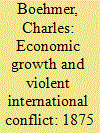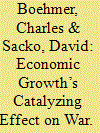| Srl | Item |
| 1 |
ID:
064658


|
|
|
| 2 |
ID:
096268


|
|
|
|
|
| Publication |
2010.
|
| Summary/Abstract |
Are states with growing economies more likely to become involved in violent interstate conflicts? This project examines whether economic growth increases international conflict using a global sample of states from 1875-1999. The theory argues that multi-year economic growth increases the resolve of state leaders to reciprocate and escalate militarized interstate conflicts, thus increasing the occurrence of fatalities or war. The results show that economic growth, but not growth of military expenditures, raises the risk of violent interstate conflicts. The results do not support the proposition that economic slowdowns result in violent interstate conflicts.
|
|
|
|
|
|
|
|
|
|
|
|
|
|
|
|
| 3 |
ID:
192057


|
|
|
|
|
| Summary/Abstract |
This paper explains the circumstances where economic growth increases the likelihood of interstate war. Optimism created by high and sustained economic expansion permeates a state, increasing elite and mass optimism for the use of deadly force. Without relief, such unbridled sanguinity can lead states to war. However, other forces reduce the probability of war. Regional democracy, bilateral trade, and trade openness slow down the process where states go to war. This paper hypothesizes that key factors raise the temperature of disputes, increasing the likelihood of a political dispute combusting to war, while other attributes inhibit the process to war. Economic growth catalyzes such reactions, while regional and joint democracy impede the probability that a war sparks. This paper produces monadic and dyadic results demonstrating that economic growth increases the likelihood of war, while other factors such as interstate trade openness, bilateral trade, dyadic democracy, and regional democracy slow down the process of war, making war less likely.
|
|
|
|
|
|
|
|
|
|
|
|
|
|
|
|
| 4 |
ID:
059894


|
|
|